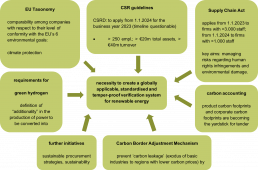Verification of Renewable Energy in Industry (Application in Industry - Report I1)
The environmental impacts of economic activities are increasingly the subject of public interest and are therefore being regulated more and more. In addition, companies are voluntarily aligning their actions with environmental protection standards in order to meet the requirements of their customers. Particularly in climate protection, certificates for renewable energy (RE) play a major role, as their use represents a major lever for greenhouse gas (GHG) reductions in industry.
Guarantees of origin (GOs) for electricity and mass balancing for biogas and liquid fuels are already well established and serve various purposes, as described in previous GO4I reports: for example, to meet regulatory requirements (so far mainly mass balancing), but also for the purpose of mandatory or voluntary reporting or GHG accounting (e.g. electricity GOs in the market-based approach).
In principle, RE certificates have the potential to promote the growth of RE generation, not least due to the increased demand by industry. However, regulatory uncertainty, complexity, the lack of transparency, standardisation and functionality, as well as counterproductive developments in RE verification systems pose major challenges for the handling of RE verification in industry. In addition, before implementing new GOs for renewable gases and heating/cooling into their business practice, the companies need to see the possible use cases (see also GO4I Energy Sources Reports 2, Bowe and Girbig 2022, and 3, Styles and Claas-Reuther 2022).
To elaborate on these topics, in the following this report first describes the drivers of the use of RE certificates in the industrial context (section 2) and then presents the main challenges and resulting requirements (section 3). Finally, the requirements for RE verification systems in industry are summarised (Section 4).


